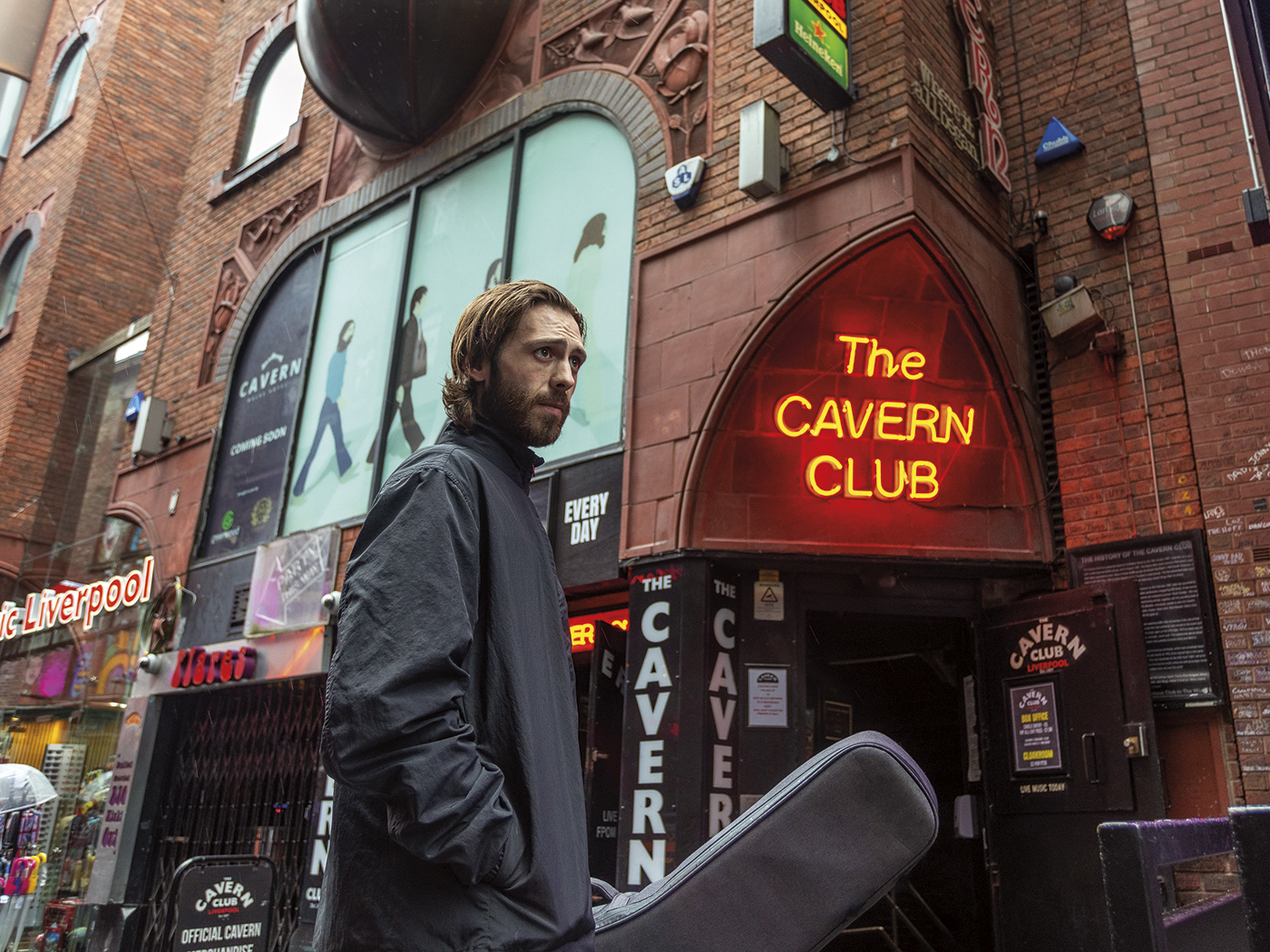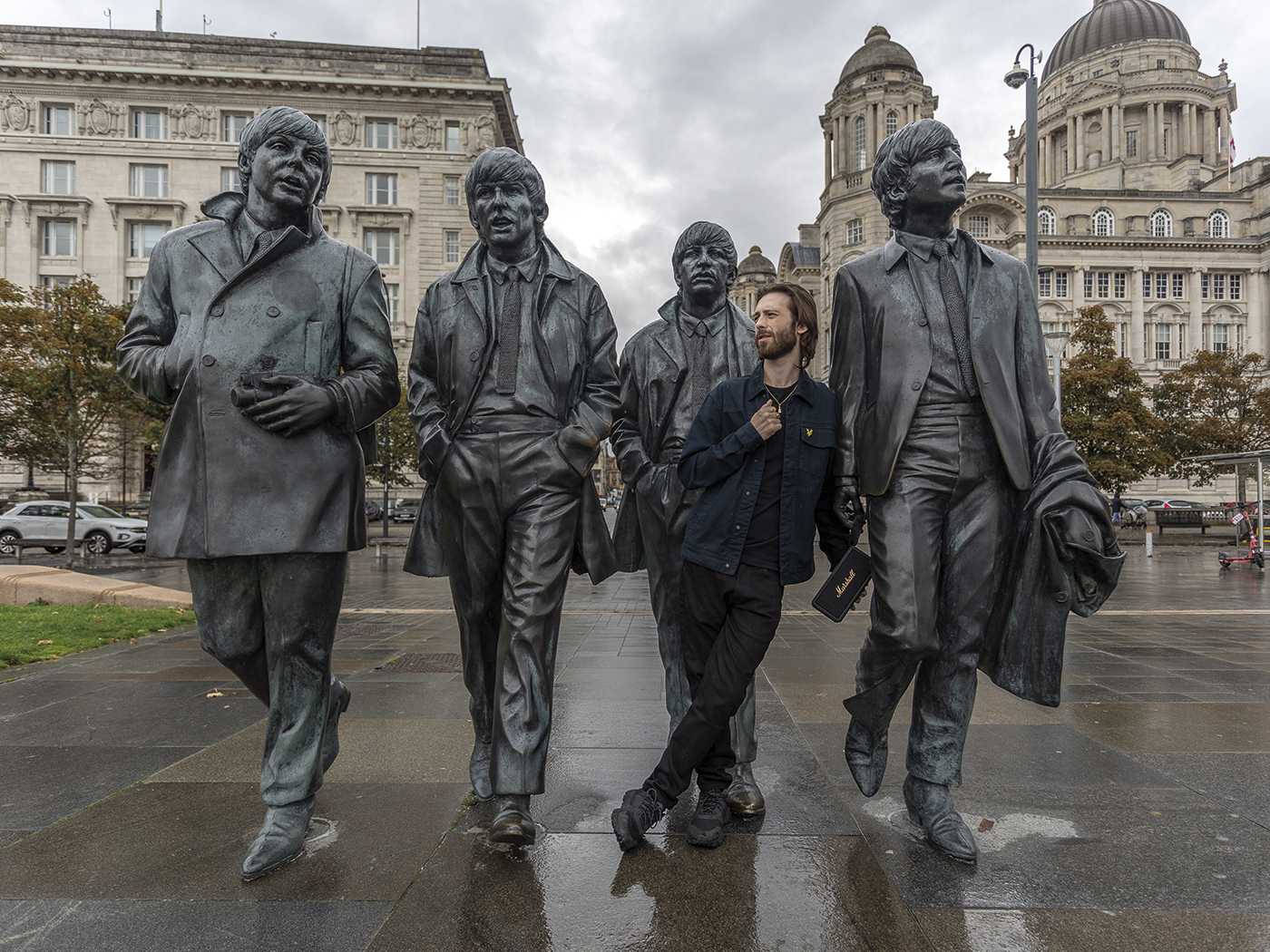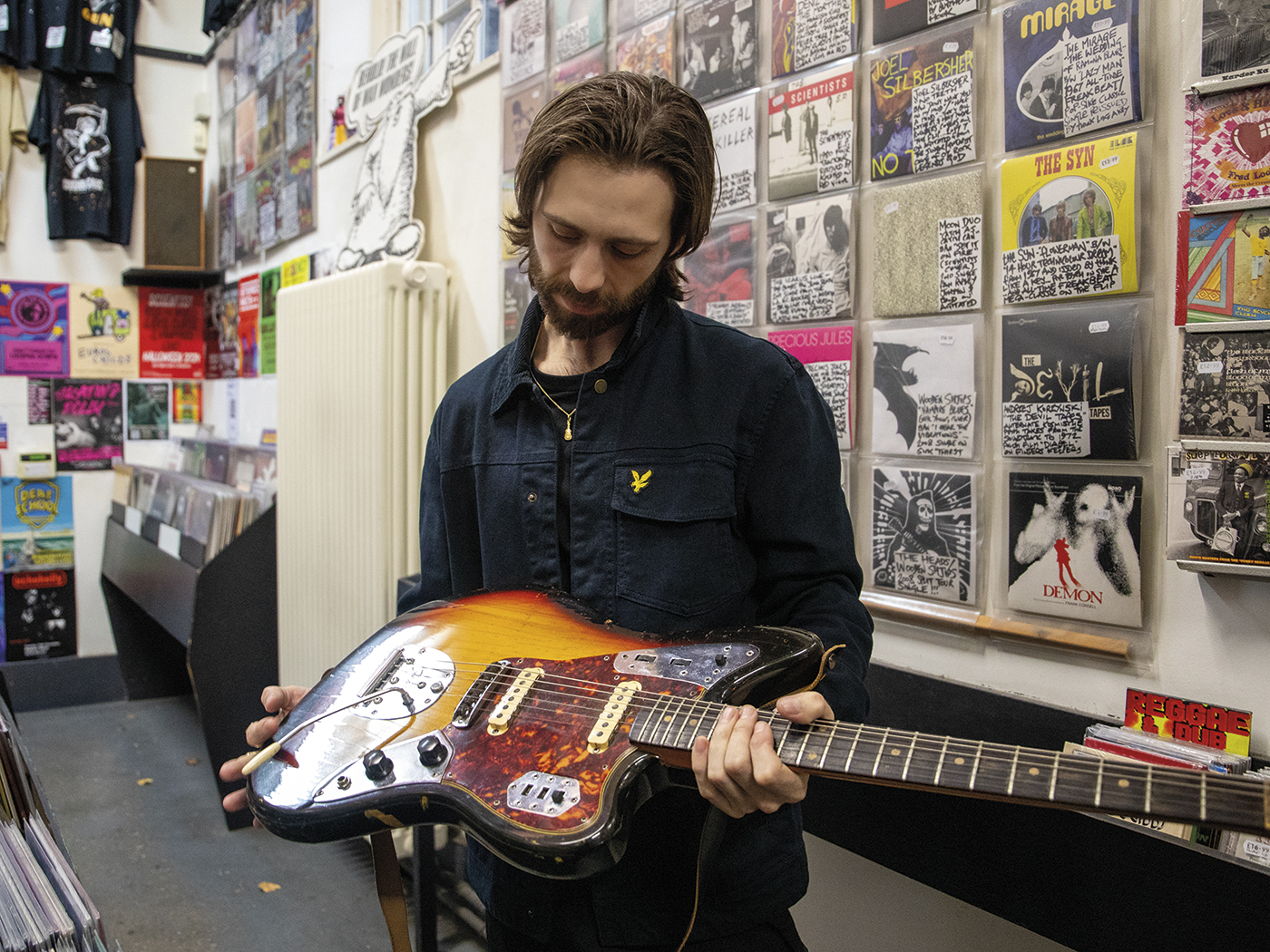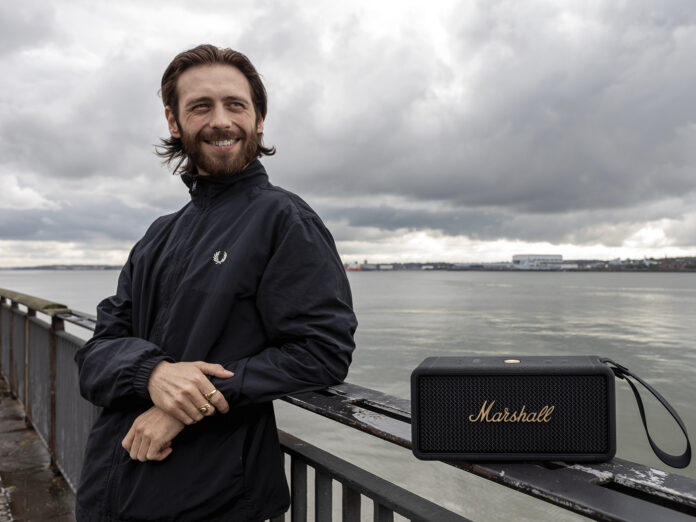In partnership with Marshall
In partnership with Marshall
Laurence Jones was thrilled when he was sent his first Marshall amp after turning professional at 17, but soon realised he needed to send it back. “It was too loud for the size of venues I was playing,” he grins. “I asked Marshall if they could hold on to it until I’d made it into bigger venues. A few years later, I got in touch with the same guy at Marshall and said I was ready to have it back.”
Now signed to the Marshall record label, Jones picked up his first guitar as a kid, determined to become better than his dad at playing “House Of The Rising Sun”. He was inspired by the blues clubs of Liverpool where his dad – a music lover – would take Jones as a child. His dad introduced him to acts like Jimi Hendrix, The Groundhogs and Cream, while Jones discovered The Cure for himself, falling in love with Robert Smith’s gift for songwriting.
Trained in classical guitar but a rocker and bluesman at heart, Jones was a prodigy, playing his first gigs as a 14-year-old wedding singer and forming a band to play local pubs and clubs. “We called ourselves Free Beer so we could put that on the posters – Free Beer here tonight,” he says. It was surprisingly effective.
Jones hasn’t stopped working since. He has released eight albums – most recently Bad Luck & The Blues – and won numerous awards. He’s also toured with the likes of Ringo Starr – a huge thrill for a Liverpudlian – as well as Buddy Guy and Status Quo. He’s enjoyed success in the Netherlands, where he developed a loyal fanbase and it’s here that he experienced a memorable jam with Buddy Guy.
“Buddy is like the Liam Gallagher of the blues,” says Jones. “He was so rock’n’roll. He was throwing plectrums into the audience while I was playing and loving the fact he didn’t have to do any work because I was there. We did ‘Strange Brew’ because he knew I liked Clapton, then went into ‘Miss You’. While we were playing, he walked off stage and got into his limo. He waved goodbye and drove off. He was back at the hotel before I ended the set. Later, I looked at the plectrum he’d given me and he’d written, ‘Buddy Guy, thank you, go fuck yourself.’ I loved it!”
Since signing with Marshall for his 2022 album Destination Unknown, Jones has revelled in the freedom the label has provided, allowing him to self-produce and forge his own direction. For Bad Luck & The Blues he pared his group back to a trio and recorded them live at the Marshall Studio in Milton Keynes, eager to capture some of the prowling energy of those classic power trios. “I love the look and sound of a power trio,” he says. “There’s nowhere to hide. When we had the keyboard, I was always having to play around it but now I have so much space and freedom. The sound is so big. How do you do that? You need a couple of Marshall stacks and you need to turn them up loud but it’s also about the style of the songs, with the writing driven by guitar rather than piano or vocal. That makes a huge difference.”
Jones had previously recorded most of his albums abroad so loved having the opportunity to record in the UK in a studio that he says was “a real step up” thanks to Marshall’s sourcing of vintage equipment, from the mics and amps to the Neve console. His dream was to capture his live sound in the studio, which means his natural desire to combine classic pop melodies with improvised solos. And his love of The Cure hasn’t gone away either – during one song, “In Too Deep”, he will drop in a little reference to “A Forest”, much to the delight of knowing fans. It’s a reminder that for all the focus on genres, music should never be put in a box.
“I grew up with the blues and my playing is very bluesy, but my themes are more contemporary and my songwriting is very diverse,” he says. “I’m trying to bring a younger audience into the blues because it can be very purist, but for me, it’s all about the songwriting, the solos and playing my guitar. That’s what excites me.”
City To City: Liverpool
Laurence Jones takes us on a musical history tour of his hometown haunts

Gazing out over the Mersey from Liverpool docks towards distant Birkenhead, Laurence Jones is thrilled to be back in his home city. His family moved to Warwickshire before he reached double figures, but Jones was moulded by Liverpool and still considers himself a Scouser at heart. Even after leaving the city, he returned throughout his youth to visit grandparents, aunts, uncles and cousins, and this is where he made some of his first live appearances, playing the city’s network of Labour clubs, performing the blues on guitar between the meat raffle and a stand-up comedian.
“That’s one thing I really like about Liverpool, it provides a natural progression so you can start in the bars and Labour clubs, and then move up to bigger venues like The Cavern,” he says. “Then you can keep going. There’s the Epstein Theatre, where we supported King King, and the Philharmonic Hall, which has two rooms and is where I played with Status Quo. You can keep going up to the Arena, all the way to Anfield. That’s what made it great to grow up around here. But you have to be tough. It’s hard growing up in the shadow of The Beatles as it means the audiences have very high expectations. It’s a hard fanbase but one of the best as it can be very rowdy and very loyal.”
Images of The Beatles are everywhere in Liverpool. After posing by a statue of the Fab Four at the dock we head towards Mathew Street, home of The Cavern. This alleyway could be the closest thing England has to Memphis’s Beale Street or New Orleans’ French Quarter, a charismatic strip of clubs and bars, with neon lights and live music pounding from every doorway to attract tourists. There are more statues – of Cilla Black as well as John Lennon – plus a wall of bricks with the names of every act that played The Cavern.

The original Cavern Club was demolished in the 1970s before being excavated and reopened in 1984 on a location that covered 70 per cent of its original site. That is authentic enough to attract legions of tourists down the dark stairs into The Cavern’s musty interior for regular gigs. Facing it across Mathew Street is the latest iteration of Eric’s, the legendary punk venue that hosted The Clash, the Ramones, the Pistols and Talking Heads, as well as providing a crucible for Liverpool’s fertile post-punk scene. Mathew Street is also home to the Beatles Museum, which Jones remembers visiting with a
much-missed uncle.
Mathew Street’s reinvention as one of the country’s premier music destinations is typical of Liverpool’s resilience. Jones recently played a show at the Salt And Tar in Bootle, a new 3,000-capacity outdoor venue that occupies the unpromising site of an old car park overlooked by high-rise flats. “I love that about Liverpool,” he says. “They can make something good out of any situation, even an old car park.”
It was at this show that Jones played many of the rockers from his recent album Bad Luck & The Blues. He’d written these at home and then played the demos through his Marshall Bluetooth Middleton speaker. “I love the Bluetooth speaker because they’re portable and easy to use, and that’s important because I’m not very techy,” he says, while his wife and manager Amy nods in agreement. “I really love the fact they look like an amp – you can even stack them, like
a proper Marshall! I use them when I’ve recorded my demos on the phone, because I can really blast it through the speakers and it’s very good at picking up the bass.”
From Mathew Street, we wander down to the tiny record shop,
Probe, which prides itself on being “the home of the underground”. As a child, Jones accompanied his music-loving father to The Musical Box, which was opened in 1947 and is one of the oldest record shops in the world. Customers included John Lennon and Pete Best, already local legends. Jones is a vinyl fan and vividly recalls the first time he heard “Just Like Heaven” on his dad’s stereo. “It’s my favourite song and on vinyl it can’t be beaten,” he says.
Probe hasn’t been around quite as long, having opened in 1971. Later that decade it became the centrepiece of Liverpool’s independent renaissance: shop assistants included Julian Cope, Courtney Love, Pete Burns and Pete Wylie. Founder Geoff Davies died in 2023, but the shop continues, with walls stacked with seven inches from independent bands new and old. While Jones flips through the racks, the shop’s manager quietly disappears into a back room and re-emerges with his pride and joy, a 1963 Jaguar. He hands it to Jones for a play, and soon the two of them are lost in the world of guitars. When Jones finally leaves Probe, he’s practically flying: it’s been another memorable day in the musical life of Liverpool.



